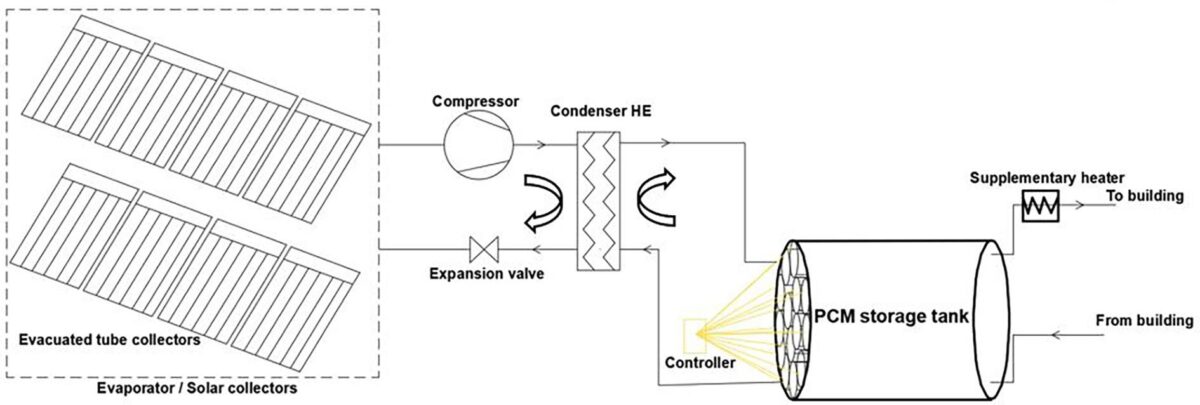An international group of researchers led by the University of Nottingham in the United Kingdom has developed a novel residential direct-expansion solar-assisted heat pump (DX-SAHP) system that utilizes a heat storage tank made of a phase change material (PCM).
PCMs can absorb, store, and release large amounts of latent heat over defined temperature ranges. They have often been used at the research level for PV module cooling and the storage of heat.
The researchers explained that their new heat pump concept is intended for demand shifting in space heating and domestic hot water (DHW) applications. It consists of a heat pump, the PCM tank, and tube solar heat collectors.
“Unlike conventional bare/unglazed solar collectors, the evacuated tube collectors demonstrate superior performance in cold and low solar radiation areas/seasons,” the academics said, referring to the solar-thermal technology they chose. “By adopting evacuated tube collectors, the system can overcome the negative impact of cold weather conditions and function optimally day and night.”
The heat pump consists of a compressor, a condenser, an expansion valve, and an evaporator. Its hot water outlet temperature reaches up to 73 C for various heating loads, and its water flow rate is constant at 0.32 kg/s. The storage tank is a conventional cylindrical tank with the PCM tubes being immersed inside to enhance its heat capacity.
In the proposed system configuration, the collectors act as an evaporator of the refrigerant in the heat pump. The evaporated refrigerant is then conveyed to the compressor, where its pressure and temperature increase. This working fluid is then condensed in a heat exchanger. At a later stage, its temperature and pressure are lowered by the expansion valve.
“The PCM charging process is limited to solar hours since the heat pump can only operate during this period,” the academics explained, adding that the high-temperature heat provided by the solar collectors is transferred to a hot water loop, connected to the PCM storage tank, where the circulated water heats the PCM tubes. “As a result, the system enforces load shifting from peak times to daytime, aligning with solar energy availability.”
According to the research team, after it is fully charged, the water tank can store hot water at temperatures of up to 70 C, with the PCM temperature reaching up to 58 C. This water can be used during the nighttime or even to cover the early morning peak load, without substantial temperature decreases, the group said.
The scientists conducted a series of simulations considering a tube collector area of 31 m2, solar irradiance of 150 W/m2, and an ambient temperature of −5 C. They found the system was able to achieve a coefficient of performance (COP) of 2.3 and a 6 kW heating output. “When the heating output is reduced by 1 kW, or when the ambient temperature increases to 8 °C, the system's COP demonstrates a significant increase of 13% in both scenarios,” they added.
Compared to conventional heat pumps, the system was also found to reduce electricity consumption by 9.4% on a low solar day. “For one month of operation, the overall COP of the DX-SAHP and conventional HP units were found 3.98 and 2.33, respectively,” the researchers concluded.
The proposed system was presented in the study “Direct-expansion solar-assisted heat pump coupled with crystallisation-controlled supercooled PCM for shifting building electricity demand,” published in Energy and Buildings. The research group also includes scientists from the Hubei University of Technology in China.
This content is protected by copyright and may not be reused. If you want to cooperate with us and would like to reuse some of our content, please contact: editors@pv-magazine.com.




By submitting this form you agree to pv magazine using your data for the purposes of publishing your comment.
Your personal data will only be disclosed or otherwise transmitted to third parties for the purposes of spam filtering or if this is necessary for technical maintenance of the website. Any other transfer to third parties will not take place unless this is justified on the basis of applicable data protection regulations or if pv magazine is legally obliged to do so.
You may revoke this consent at any time with effect for the future, in which case your personal data will be deleted immediately. Otherwise, your data will be deleted if pv magazine has processed your request or the purpose of data storage is fulfilled.
Further information on data privacy can be found in our Data Protection Policy.